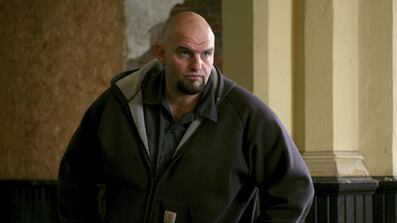Enough of the White House’s pencilheads and the Tea Party’s lunatics! The people who can beat back the recession and American gloom are already manning the front lines. By Tina Brown
"I am not an adviser. Not an analyst. You know, I’m a doer.”
This was Mayor Bloomberg in yesterday’s New York Times. If ever there was a political breed we need, Bloomberg just named it. And he named himself: He's a doer—a credible doer, living on practical achievement, not fumes.
The wingnuts dominating the Tea Party movement are exploiting the just rage of a generation of Americans who feel they’ve been stiffed in the last decade. But, as Bloomberg remarked yesterday, anger is not a strategy. Palin, O’Donnell, and Co. don’t have one. They have scripts for a burlesque starring demagogues, saboteurs, and loudmouths. They are the “undoers.”

Nor is America yearning for “empathy” from the Oval Office. People are way beyond “I feel your pain.” No one is asking for an Oprah in Chief. Anyhow, Obama is too chilly by nature ever to be convincing as a human care package. He'll never be able to do what Bill Clinton did on Meet the Press yesterday when he moved easefully from a cerebral deconstruction of the economic crisis in words we can all understand to the practicalities of crushing earthquake rubble in Haiti. Rubble just doesn't feel like an Obama word.
What America is thirsting for now is a battalion of strong, down-to-earth “doers”—managers, frontline activists, business and social entrepreneurs engaged in tackling America’s manifold problems of unemployment, education, and competitive slouch.
Democrats inherited and fixed a busted banking system. But there’s a human bank they should have drawn on—the bank of amazing practical talent to be found not in Washington or the academies but among a crop of audacious American mayors. Not only the high-profile, self-made billionaire Bloomberg, but brave change agents like Fetterman of Braddock, Reed of Atlanta, Booker of Newark, and Landrieu of New Orleans.
No one in America is yearning for “empathy” from the Oval Office. People are way beyond “I feel your pain.”
We’ve heard a lot about Mayor Cory Booker’s success fighting crime, but he’s only one of many on the frontlines of rebuilding America—including places like tiny Braddock, Pennsylvania (pop. 2,700), which you’ve probably never heard of. Try Braddock’s 6 foot, 8 inch, 300-pound Mayor John Fetterman on for size.
He’s a Harvard public policy MA with a tattoo of his city’s ZIP Code on his forearm, plus the dates of murders since his election. Fetterman has taken the superhero’s mission of rescuing his crumbling, historic steel mill town, abandoned by 90 percent of the population since 1950—all while making a paltry $150 a month as mayor. (He also works as the director of a program for local youth.) This guy is a Rust Belt savior. He has partnered with Levi Strauss in an imaginative ad campaign that’s injecting a million dollars into the struggling town.
Hard to get more can-do blue collar than a steel-town mayor in dungarees.
Then there’s Kasim Reed of Atlanta—black, 41, charismatic, boldly grasping the third rail of school reform after being elected in January. (Ask Washington, D.C.’s Adrian Fenty how nuclear that can be.) At the Aspen Institute, Reed told a riveted crowd, “We’re going to be the generation that has to do things that are hard.” He believes that government must earn trust at the smaller levels before people will have faith in it at the national level. How’s that for a radical grassroots idea that is bubbling upward?
New Orleans Mayor Mitch Landrieu also feels like a rising national star to me. He won his election in February with an outpouring of biracial support. He's a compact dynamo who radiates resourceful passion to clean up the towering mess left by Hurricane Katrina, Bush and Brownie, and the corruption that only grew under Landrieu’s City Hall predecessor, the incompetent showboat Ray Nagin. In his first 100 days, Landrieu worked to "reorganize the dysfunction of the city government," revamping the police department, and staunching the city’s bleeding out of a $67.5 million budget shortfall. That’s a schedule more ambitious than the first six days of Genesis.
Can’t some of these guys be used as surrogates for the Democratic message on reviving jobs instead of the wall-to-wall Wall Street weenies of Obama’s Treasury Department?
Can we also please just dump the wan call for “centrists” to come forward? And start calling out for Doers instead? Centrists are so clueless that it takes a pair of comedians—Jon Stewart and Stephen Colbert—to do something as elementary as announcing a march on Washington for October 30 just to yell for Reason.
Democrats live in hope that the electorate will recoil from the lunatics who have seized the GOP asylum. Unfortunately, the president and his inner council come off as pencilheads who have been busy building bureaucracies to ponder and regulate while the few guys left in the generating room—the ones who know positive from negative—are trying to get the lights back on.
The tectonic shift of the banking crisis was created as much by flawed process as it was by greed. All those huge mergers in the late '90s and early 21st century looked smart and “global” and were mutually enhancing to the suits picking up their monstrous bonuses. But underneath in the daily business of how work gets done, it was unresolved muddle—ill-thought-out new reporting lines, broken customer client relationships, hasty whiz kid “innovations,” and McKinseyesque staff “rationalizations” that ran roughshod over institutional knowledge and the best of in-house talent whose understanding was ignored.
Goliaths slayed the Davids. Behemoths killed nimble execution. “Out of the box” corporate thinking helped carry real American innovation out in a box. A pine box.
The talk is that Obama’s Chief of Staff Rahm Emanuel wants to go back to Chicago to run for mayor, to join the roster of mayors who are the last remaining public servants who know how to get things done. But maybe what we need is not to export White House wisdom to the frontlines. Maybe what we need is to import frontline grit into the White House. “Yes We Can” was a great slogan for 2008 but, for 2012, I’d prefer to recycle this mantra: “Just Do It.”
Tina Brown is the founder and editor-in-chief of The Daily Beast. She is the author of the 2007 New York Times best seller The Diana Chronicles. Brown is the former editor of Tatler, Vanity Fair, The New Yorker, and Talk magazines and host of CNBC's Topic A with Tina Brown.






